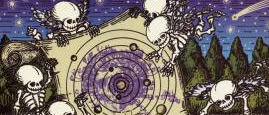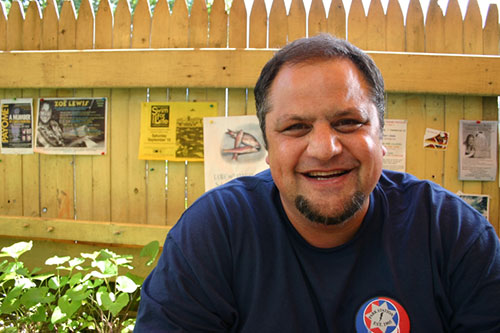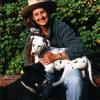
You are probably already familiar with Grateful Dead scribe Steve Silberman. He's written countless essays and liner notes and even co-authored a book on the Dead, not to mention his co-producer credit on the must-have boxed set So Many Roads (1965-1995). But what do you really know about the man who so eloquently delivers the spirit of Spring '77 to this release? We're shedding a little light on Steve and his long-running connection with the Dead right here.
Let's jump right in. What was your first Dead show?
I was one of thousands of eager hippies that showed up in a field in upstate New York on July 27th, 1973, the day before the official start of the Summer Jam in Watkins Glen, an attempt to recreate the magic of Woodstock featuring the Dead, the Allman Brothers, and the Band. I was 14 years old, all on my own because my friend bailed on me at the last minute, and relatively clueless; I was mostly there to see the Allman Brothers. Then the Dead came out and played a wonderful set that included the legendary "soundcheck jam" that we ended up putting on the So Many Roads box set -- a gorgeous suite of improvised music containing several themes they would never play before or after that. I wish I could say I fully appreciated it at the time, but that would be lying. In truth, I was completely overwhelmed by being in the middle of a crowd of 600,000 people, had been dosed multiple times by sipping from the bota bags that everyone was passing around, and I really, really had to pee -- but the Porta-Sans might as well have been an island nation away from where I was standing. Still, the experience stuck with me, because I went to see the Dead at Roosevelt Stadium in Jersey City the following year, which turned out to be another all-time highlight of the band's 30-year career (excerpted on Dick's Picks Volume 31). During Phil's bass lead in "Eyes of the World" -- this was still in the first set, mind you -- I knew I had never heard music as beautiful, adventurous, and alive as this in my entire life. That was the moment I became a Deadhead, and I never stopped.
You lead a double life. In addition to writing about the Dead in dozens of liner notes for projects like the So Many Roads, Europe '72, and May 1977 box sets, and in books like Skeleton Key and The Grateful Dead Reader, you're also an award-winning science writer and blogger for Wired magazine and the Public Library of Science, and you're working on a book about the history of autism called NeuroTribes: Thinking Smarter About People Who Think Differently, which will be out next year. How did you get interested in writing?
When I was growing up in New York City, I entered a poetry contest for kids run by Fordham University. My 5th grade English teacher encouraged me to do it. While I was writing the poem -- which was about how much I sucked at math, though I didn't put it that way -- I remember thinking, "Hey, I can do this!" I couldn't do math, I couldn't do sports because I was chubby dork and the other kids made fun of me, and I hated playing games with lots of rules to memorize, like chess. But in writing, the rules seemed to make themselves up as you went along -- which is different, by the way, from making the rules up yourself as you go along, and has to do with what poets have traditionally called "the Muse." The Muse was kind to me that day, and I ended up winning the contest. My poem was sent to Expo '67, where it was played in a continuous loop in several languages in one of the exhibits, and my parents took me to some big ad agency in Manhattan to have my picture taken. Fame!
But the experience that really made me want to be a writer was seeing the Beat poet Allen Ginsberg give a reading at Queens College when I was 19. The following summer, I became one of his apprentices at Naropa University in Colorado, and I got to hang out with a lot of my heroes: Allen himself, William Burroughs, Gregory Corso, and others. I got to see how real writers -- writers who had changed the world! -- lived from day to day. I was hooked.
How did you start writing about the Dead?
When I was going to all those shows in the late '70s and '80s -- Dead shows, Jerry band shows, Reconstruction, the Bob Weir band, Rhythm Devils, the whole curriculum -- it would often occur to me that some day, some kid was going to come along and be the Jack Kerouac of that scene, as Kerouac himself had been for Ginsberg and all the Beats with his great book On the Road. But you know what? That kid never came along. So after being introduced by a mutual friend to a great writer named David Shenk, who had this wacky idea of doing a Deadhead dictionary, I told him it should be more than just another novelty Yuppie Handbook that would be forgotten six months later. It should be an in-depth history of this fabulous zany subculture that was half like a baseball game and half like the church of the Cosmic Whatzit -- an indigenous psychedelic subculture that dwarfed the psychedelic subcultures that serious anthropologists and historians were writing books about. And David was all for it. That book became Skeleton Key: A Dictionary for Deadheads, which was published in 1994. One of the most amazing moments of my life was when Bear/Owsley came up to me at Shoreline and asked me to sign his copy. I wrote something like, "Without you, this book would not exist," which was certainly true. After that, the Dead organization started asking me to write liner notes for their CDs and DVDs, and to co-produce the So Many Roads box set with David Gans and Blair Jackson.
That was fun, because I got to work with Dick Latvala, Keeper of the Vault, who I'd become buddies with while researching Skeleton Key. The versions of "The Same Thing" and "Scarlet > Fire" on So Many Roads were Dick's suggestions, and we stumbled on the luminous rehearsal of "Whiskey in the Jar" on an unlabeled tape just after visiting Dick in the hospital as he was dying, so I think of that amazing discovery as a departing gift from his spirit. He also willed to me this huge crate of "rare" reel-to-reels that I never bothered to listen to, and finally threw away last week (KIDDING).
I loved Dick. He was hilarious. When he found a new jam that melted his brain into a tie-dyed puddle, he'd call me up raving: "This is better than Beethoven!" I miss the sound of that sweet, cranky man's voice, though David Lemieux and Jeffrey Norman are doing a great job of maintaining the tradition with Rhino releases like the Road Trips and Dave's Picks series, and mammoth projects like May 1977.
What are the standout moments for you on May 1977?
Since there are so many, I'll just mention one: Check out that "Sugaree" from St. Paul on May 11. In the middle of a fairly standard performance, Jerry gets very excited, and the whole band joins him, and suddenly the Civic Center Arena lifts off the ground and heads for the stratosphere. That's what it's all about.
Steve Silberman's writings are archived at stevesilberman.com. Please follow @stevesilberman on Twitter.







